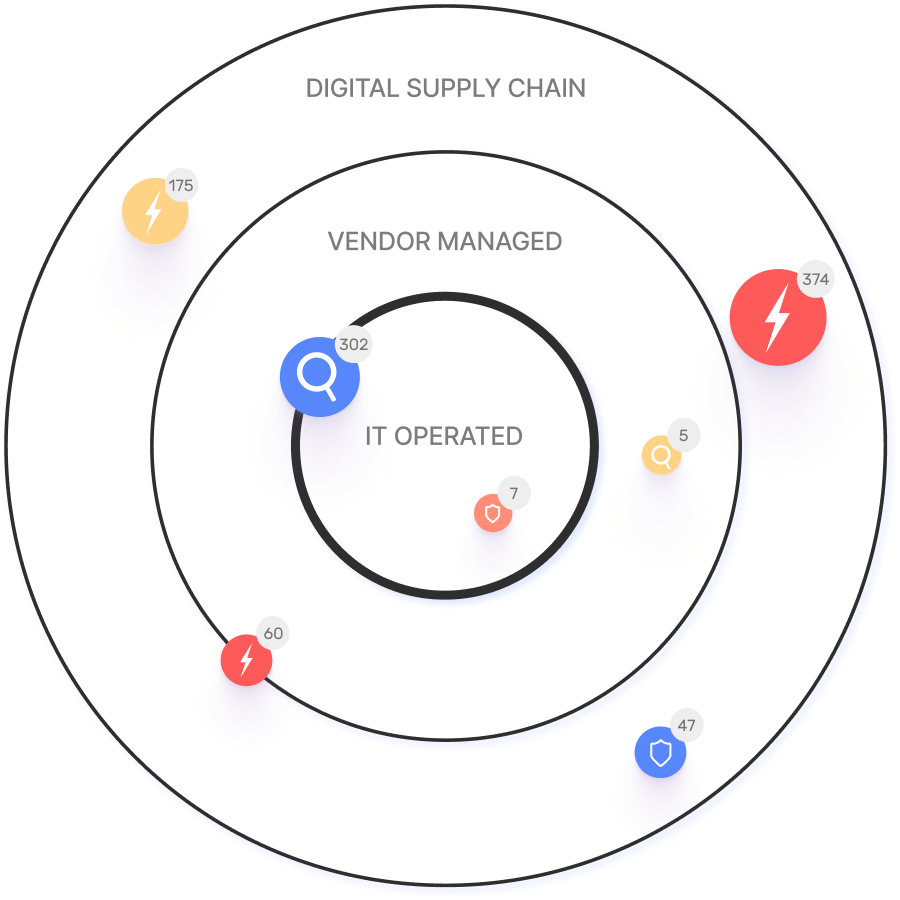31 Cybersecurity and IT Management Professionals Share Their Favorite Vulnerability Management Interview Questions

The attack surface is expanding, driven by the growth of shadow IT, cloud adoption, mobile, and the Internet of Things (IoT). With an expanding attack surface comes an ever-increasing number of vulnerabilities introduced into a company’s network, making vulnerability management a top priority for companies across all industries.
Many companies hire vulnerability management professionals, such as vulnerability assessment analysts, to oversee the ongoing process of vulnerability management, assessment, and remediation. These professionals have a deep understanding of the risks introduced by a growing attack surface, how to prioritize risks based on their potential impacts, and how to implement the right security controls for attack surface reduction.
They’re also up to date on the latest best practices and technologies, including emerging markets such as external attack surface management (EASM). They understand the critical need to maintain a sharp focus while avoiding false positives that contribute to noise and alert fatigue, and they know how to leverage technologies such as attack surface management (ASM) solutions to stay laser-focused on the most serious exploitable risks.
Given the complexity of vulnerability management, you want to be sure you’re hiring the right candidate for this role. However, interviewing these candidates can be challenging, particularly if the interviewer isn’t well-versed in the technical aspects of vulnerability management. To help you ask the right questions to identify the top vulnerability management candidates, we reached out to a panel of cybersecurity and IT management professionals and asked them to answer this question:
“What’s your favorite vulnerability management interview question (and why)?”
Meet Our Panel of Cybersecurity and IT Management Professionals:
Read on to learn what our panel had to say about their favorite vulnerability management interview questions and why they’re effective.
Walter Haydock

Walter Haydock is the Founder and Chief Executive Officer of StackAware, a cybersecurity risk management and communication platform. He was previously a Director of Product Management at Privacera, a data governance startup backed by Accel and Insight Partners, as well as PTC, where he helped to secure the company’s industrial IoT product lines.
“I would ask the candidate to…”
Compare two different known vulnerabilities. One is rated as ‘Critical’ according to the Common Vulnerability Scoring System (CVSS) while the other is merely ‘High.’ The second issue, however, is present in a known malicious package. I would ask the candidate which should be addressed first.
Although according to the CVSS the first issue is more severe, it should be clear that the known malicious package should be a much higher priority for remediation. While only 5-10% of known vulnerabilities are exploitable in any given configuration, due to the fact that they are generally the result of accidental coding errors, a vulnerability resulting from a malicious package was put there intentionally by a hacker intending to infiltrate as many systems as possible. A real-world example of this would be comparing CVE-2017-8283 to CVE-2017-16044.
Furthermore, this question tests if the candidate robotically uses the CVSS rating to prioritize, which, although simple, is widely regarded as being unadvisable.
Joshua Wood

Joshua is the Founder and CEO of Bloc, a social events platform that helps create unforgettable events and experiences.
“One of my favorite interview questions for vulnerability management is…”
What are some common ways that attackers can exploit vulnerabilities in systems? This question helps to gauge how well the candidate understands common attack methods and how they might be able to prevent those attacks from happening.
Another great question for assessing vulnerability management skills is:
How do you prioritize vulnerabilities in a given system? This question helps to determine how well the candidate understands the risk posed by different vulnerabilities and how they would go about allocating resources to fix them.
Eric Florence

Eric Florence is a Cybersecurity Analyst at Security Tech.
“The question that tells the most about a candidate’s understanding of vulnerability is…”
What is the difference between risk and vulnerability? These two are often confused, and a vulnerability manager has to be clear on the differences. Risk is the potential for harm if a threat exploits a vulnerability. A vulnerability is the weakness that a threat exploits.
Haris Bacic

Haris Bacic is the co-founder and CEO of the largest price transparency website in the world, PriceListo. PriceListo enables consumers to view and research pricing information for any business establishment for free.
“My favorite vulnerability management interview question is…”
What is your experience with managing vulnerabilities?
This question allows me to gauge the candidate’s level of experience and understanding of the topic. It also allows me to ask follow-up questions about specific vulnerabilities they have managed in the past and how they went about doing so.
Ranee Zhang

Ranee is a VP at Airgram and loves to research and execute. With a computer engineering background, he is focused on focusing on the machine learning side of the business.
“My favorite vulnerability management interview question is…”
What is your experience with patch management?
I like this question because it gets to the heart of what vulnerability management is all about: preventing and mitigating software vulnerabilities. Patch management is a key part of any vulnerability management program, so it’s important to gauge a candidate’s experience and knowledge in this area.
Matt Payne

Matt Payne is the CEO of Width.ai, a machine learning consulting firm that builds innovative and state-of-the-art artificial intelligence applications for businesses all around the world.
“My favorite interview question in a vulnerability management interview is…”
How would you go about assessing vulnerabilities in a system?
This question allows me to gauge the candidate’s understanding of the identification and assessment of potential security risks. Furthermore, this question can help me gauge a candidate’s critical thinking skills and ability to come up with creative or unique solutions to problems.
A good answer to this question would discuss the various methods of vulnerability assessment, such as network scanning, application testing, and manual review of code and configurations. The candidate should also be able to explain how these methods can be used to identify potential vulnerabilities in a system.
Lauren Farley

Lauren is the Co-founder of MotelMatcher.com, a project dedicated to helping travelers find cheap motels all over the US.
“My favorite vulnerability management interview question is…”
How would you explain your job to someone who has never heard of it?
I love this question because there’s a lot of confusion about what exactly vulnerability managers do. Many companies have a Network Security department responsible for patching vulnerabilities on the network, but that’s not it at all!
Vulnerability management is much more than just patching holes in your company’s security — it’s about preventing those holes from opening up in the first place.
The best way to think about vulnerability management is like this: imagine you’re building an apartment building with no windows or doors on it. You wouldn’t want to live in it! So you’d build your apartment building with windows and doors from day one so that no one could get into or out of your apartments without them.
It works the same way with vulnerabilities — you want to build them into your system from the very beginning so that no one can use them against you later down the line.
Joshua Crumbaugh

Joshua is an academic peer-reviewed author and ethical hacker who has never encountered a network that could keep him out. Joshua is the founder of PhishFirewall and is globally recognized for his research into security awareness and social engineering attacks.
“My favorite vulnerability management interview question is…”
Excluding Log4Shell, what are three critical vulnerabilities that still exist in nearly every network? I want to know that they have a good understanding of what the typical issues are. This is an easy question for anyone with real experience.
Rick Nehora

Rick Nehora is the Managing Director at California Law Firm. They provide litigation services for civil matters related to breach of contract, fraud, suits for damages, etc.
“One of the best questions to bring up during a vulnerability management interview is…”
What is the Pareto Principle, and how is it applicable to vulnerability management? According to the Pareto Principle, only 20% of vulnerabilities result in 80% of security threats. An individual who fully comprehends this idea will be aware of exactly what to look for in case of any security lapses.
A candidate’s response to this question reveals precisely how he or she will allocate time and what methods he or she will use to identify the most serious vulnerabilities first. Therefore, assessing their responses to this question may enable you to determine whether they have a solution-oriented mindset.
Michael Miller

Michael Miller is the CEO of VPNOnline.com, one of the fastest-growing media companies in the cyber-security space.
“I love a good vulnerability management interview question that can expose a candidate’s ability to think on their feet…”
The question I like best is: Describe a honeypot.
I expect candidates to immediately start talking about the definition of a honeypot, which is basically a system designed to be vulnerable, often for the purpose of collecting data about an attacker. It’s a security mechanism that’s designed to mislead attackers by appearing to be an important or valuable resource.
It’s a great question because it shows whether or not the candidate understands common security concepts. It also gives me insight into how the candidate thinks about security and what they expect from their own employees.
I expect them to describe a honeypot as something that’s designed to look like the real thing but isn’t — and to describe its purpose. But then I also expect them to take it further and talk about how honeypots are used in different industries — like finance or defense — and what their advantages and disadvantages are.
Hammad Afzal

Hammad is the Growth Marketing Manager at Softception.
“My favorite vulnerability management interview question is…”
If you could be any vulnerability, which one would you be and why?
I love this question because it forces candidates to think about the different types of vulnerabilities from different perspectives and helps me understand how they view the role of vulnerability management. Plus, it’s a great icebreaker, and it’s always fun to hear the different answers people come up with.
John Earle

John comes from a diverse background of experience, having worked in various information security roles from architecture to incident response in industries such as finance, manufacturing, and consulting. He’s currently the founder and president of Protocol 86, a Canadian cybersecurity consulting firm.
“One of my personal favorite vulnerability management interview questions is…”
What are the important components of a successful vulnerability program?
As an open-ended question, it allows candidates to create a thoughtful response. But what makes it such a good question is that people can talk about and demonstrate their experience.
What have you seen that worked or what did you try that didn’t work at all? A successful vulnerability program is much more than just a good product, and this question opens up that dialogue.
Neil Paul

Neil Paul is the Head of Marketing at Airbrush.ai.
“My favorite vulnerability management interview question is…”
What is the most difficult security question you’ve ever been asked?
It’s a good way to get a sense of how a candidate thinks about the role and what they’re looking for.
Perry Zheng

Perry Zheng is the founder and CEO of Cash Flow Marketplace, a YC-backed marketplace for all direct real estate investments. He was an engineering manager at Lyft for 5.5 years and worked as a software engineer at Twitter and Amazon.
“The most important question to ask is…”
How do you assess vulnerabilities in an organization? This question encapsulates the gist of vulnerability management. It will let us know how much a person knows about the importance of vulnerability management and whether they think they fit the job.
Also, once the candidate responds, we can follow up with more questions based on their answers. For example, we can ask about the types of scanners they use when they describe the scanners for assessing vulnerabilities.
Karl Robinson

Karl is an AWS Certified Cloud Practitioner, an AWS Certified Solutions Architect Associate, an AWS Certified SysOps Administrator, a Datadog Sales Specialist, and most importantly, an entrepreneur and CEO of Logicata.
“My favorite vulnerability management interview question is…”
What strategies have you implemented for vulnerability management within an organization?
Not only does this question provide insight into the candidate’s technical experience and knowledge, but it also gives me an indication of what kind of approaches the candidate may take when it comes to dealing with security threats.
This is important to me as I want someone who can take a proactive approach to security rather than simply reacting after an incident has already occurred. The way they answer this question can demonstrate their ability to think critically and provide actionable solutions.
Melissa Terry

Melissa Terry is the Cyber Security Manager at VEM Tooling, one of the fastest-growing mold manufacturers in the world. They currently operate in over 5 countries with an aim to grow across borders. They have served multiple businesses including giants from Automobile, Steel, and other production houses.
“My favorite vulnerability management interview question is…”
In 2023, what do you anticipate will be the greatest security risk for businesses?
This is a complex question, and you’ll want to keep in mind that it may vary from industry to industry. Therefore, to prevent any cyber attack, every industry needs to have the most recent security updates installed.
However, this can result in an attack if the necessary security patches are not installed and weak passwords are used.
Could you elucidate the best practices for locating vulnerabilities in the software’s source code?
The interviewer wants to see how you address problems in this context. Several methods can aid in searching for vulnerabilities in a system’s defenses. You need to explain things sensibly, making good use of the means at your disposal.
Some examples include validating changes, third-party dependencies, and hard-coded credentials.
In a nutshell, what is SQL injection?
It’s like an assault, in a way. SQL injection occurs when a hacker uses code to put malicious SQL statements into a database. They can use this to obtain access to the database and take the information with little difficulty.
The use of such attacks to steal information from a wide range of sectors is on the rise globally.
Andreas Grant

Andreas Grant is a Network Security Engineer and the Founder of Networks Hardware.
“In an ideal world, I would go for questions like how they prioritize vulnerabilities or their approach to tackling one…”
However, we live in a time where it takes more effort and time to explain our task to the stakeholders rather than actually doing it. This is why my favorite vulnerability management interview question is:
How do you describe your findings to stakeholders which include both technical and non-technical individuals?
The reason behind this question is that it is important to stay on the same page with your shareholders. They need to know exactly the risks involved and the support they can provide. Being able to communicate a sense of urgency to the stakeholders can help you get half the job done as you can get the necessary resources instead of working with limited resources.
When you reach a certain stage in the interview, you are there because you have the necessary technical skills. This is where questions like this can help me figure out how the candidate stands out. Being able to explain the problem clearly and effectively also helps me see their ability to approach a problem.
Maksym Babych

Maksym Babych is an MBA Ph.D. candidate and the CEO of SpdLoad, an MVP development company for startups.
“You want to be sure that your applicant knows their job, and let’s start with something easy…”
What does security testing mean?
When you get a satisfying answer, which is telling enough, continue with asking technical details, ask:
What do you know about ISO 17799?
Also, it’s important to check the major attributes of security testing your applicant is expecting to do.
When it’s time to talk about VART in detail, ask an applicant to define the types of cross-site scripting.
John Willis

John Willis is the founder of Convertfree. He is a senior software developer on a mission to pursue knowledge and skills to better aid the products they develop.
“My favorite vulnerability management interview question is…”
What is the difference between a threat and a vulnerability?
Albeit a basic question, most people fail to understand the key differences. A person needs to have a clear view of this before they can tackle your company’s problems. Both need a different approach and mindset. There are different sets of risks in each.
Nathaniel Cole

Nathaniel Cole is a Chief Information Security Officer with 15 years of experience building and running modern security programs. He writes a cybersecurity advice column for business leaders at NetworkAssured.com.
“Many practitioners know the theoretical definition of cross-site scripting, but few understand how this exploit works, even today…”
So an ideal question to ask is:
How does cross-site scripting work?
Considering there is persistent and reflected cross-site scripting, it is a great question to better understand the individual’s knowledge when it comes to software-related vulnerabilities.
It is also a great opener to then transition into questions about why reflected cross-site scripting would be of interest, how it could be used in an attack, and how best to explain it to developers. While on this topic, it is easy to pivot into code injection at a higher level (not just SQL but any of the injection attacks), as these are similar to cross-site scripting.
Dinesh Pandian

Dinesh is a finance expert and Co-founder at Lenders.fi, a project dedicated to helping people quickly find the best loan offers with just one application.
“The question I most enjoy asking during a vulnerability management interview is…”
How do you determine the seriousness of a vulnerability?
I’ve found that this question has two main purposes. First, it helps me assess whether or not the candidate understands what makes a vulnerability serious or less serious. Second, it gives me insight into their process for determining the severity of a vulnerability and how they approach these types of questions.
Most candidates will have an answer to this question, but there are still some who seem unsure about how to answer it. If this happens, I will ask them more specific questions about their process for determining severity:
How do they prioritize vulnerabilities? Do they use any tools? What are their criteria for severity? This can help me get a better idea of how well-versed they are in security concepts and terminology.
The key thing to look out for here is whether or not they understand the concept behind severity and can explain their process in an organized way while providing examples from past experiences.
Karla Reffold

Karla Reffold is the General Manager of Orpheus Cyber, a threat-led cybersecurity company providing risk-based vulnerability management and cyber risk ratings. Karla is an award-winning business leader with a career of over 10 years in cybersecurity.
“My favorite vulnerability management interview question is…”
How do you prioritize vulnerabilities?
There are so many vulnerabilities, with an average scan returning thousands of results. I’m looking for someone who understands how to prioritize against individual business needs.
Utilizing threat intelligence is good, but even then, it can be a lot of work to find something truly actionable. If someone knows the products out there that can help, that’s even better.
Rajdeep Roy

Rajdeep Roy is the IT Manager at 20four7VA. Raj is responsible for handling all the IT-related services within the company, including the time-tracking system, company website, servers, and group data security and policies.
“My favorite vulnerability management interview question is…”
What are the five most common vulnerabilities that you see in your organization?
The reason I like this question is that it’s a great way to gauge an interviewer’s level of experience and knowledge in vulnerability management. It also gives me a good sense of the kinds of security threats that the organization is likely to face.
By asking this question, I’m able to get an idea of the kinds of security measures that may need to be implemented in order to protect the organization’s systems and data.
Oliver Goodwin

Oliver Goodwin is the CEO of Synthesys.io, a voiceover and video production platform. Their AI Text-to-Speech (TTS) and Text-to-Video (TTV) technology transform scripts into vibrant and dynamic media presentations.
“I like to ask vulnerability management interview candidates…”
What is your favorite way to discover vulnerabilities in source code?
This question gives me an idea of how they think, as well as what kind of skills they use when working on a problem.
It’s important for candidates to demonstrate that they understand that vulnerabilities can exist anywhere, not just in the final product but also in the process. Answering this question demonstrates that you know how to approach a problem from all angles, which is something I value highly in any candidate.
I also want to know if the candidate has had any experience with reverse engineering or vulnerability discovery tools, so I like to ask them about their experience with these things as well.
Michal Ciombor

Michal Ciombor is a Software Engineer at LifeandMyFinances, where their aim is to get you out of debt, manage your money, and increase profits.
“When interviewing for a job in cybersecurity, one can expect…”
A big chunk of the interview to focus on the knowledge of cybersecurity principles and best practices, the experience carrying out a variety of standard tasks, and the ability to keep up with a field that is constantly evolving.
One of my favorite interview questions is:
What is your favorite vulnerability?
It shows the seniority level of the candidate, as well as gives a wide field for discussion about attack, defense, and detection. That open question helps a lot in hiring talented people.
Leon Bierhals

Leon Bierhals is the CTO of WREI.org.
“One question that can be particularly useful is to ask candidates…”
How would you approach identifying and remediating vulnerabilities in a given system?
This question can help gauge their understanding of the vulnerability management process, as well as their ability to think on their feet.
Another question that can be helpful is to ask candidates about their experience with scanning and assessment tools. This question can help you gauge their familiarity with the various tools and methods that are used in vulnerability management.
Finally, it can be helpful to ask candidates about their experience with patch management. This question can help you determine if they have the necessary skills and knowledge to manage patches and vulnerabilities in a timely manner.
Robert Krajnyk

Robert Krajnyk is a Computer Repair Specialist at Virus Removal Australia.
“One of the questions I like to ask in vulnerability management interviews is…”
How would you perform a vulnerability assessment on a company that hasn’t updated its server infrastructure and security for at least 10 years?
There are many companies that have old infrastructure that is insecure according to modern standards. This could be due to any number of reasons, the most common reason being that the company has been around for a long time and hasn’t seen the need to update its security and infrastructure in its lifetime.
These companies are the most vulnerable to an attack, so any candidate will need to know what weaknesses to look for, especially in older systems that may have older weaknesses that may be overlooked by specialists trained in modern systems.
This question tests a candidate’s attention to detail and expertise in cybersecurity, especially in cases where they may not have all too much experience in particular systems. If a candidate can answer how they’d start looking for vulnerabilities, even if they don’t necessarily know exactly which vulnerabilities to look for, they can be relied on to be attentive regarding vulnerability testing on most systems.
Stacy Eldridge

Stacy Eldridge is a Digital Forensics & Cybersecurity Expert at Silicon Prairie Cyber Services LLC.
“My favorite vulnerability management interview question is…”
When stepping into a new vulnerability management role, how would you start getting to know and evaluating the existing vulnerability management program?
I love this question for two reasons:
- Their approach to the role: First, it gives me a peak into their approach to the role from day one. Are they focused on the tech, the number of vulnerabilities, or will they start with the foundations of any good program?
- Generating conversation: Second, their answer can generate some great conversation, which can help you get to know the applicant better.
Nikolai Khechumov

Nikolai Khechumov is the Senior Security Engineer at Avito, the most visited classified website in the world.
“My favorite vulnerability management interview question is…”
How would you motivate a developer or their manager to prioritize fixing the vulnerability you found?
It’s a good question because the resolving stage in vulnerability management is maybe more important than the detection stage.
Often you have to delegate it to somebody who may already have their workload planned. So AppSec guys have to be good negotiators and be able to ‘sell’ a problem and prove the severity.
This is where a candidate’s creativity can be checked, and also how they feel the balance between security and business interests.
David Mackler

David Mackler is the CTO at IPQualityScore, with more than 15 years in the payment, fraud prevention, and cybersecurity industries.
“My favorite question for vulnerability management interviews is…”
How do you manage the most important security objectives?
This question quickly gives the interviewer an understanding of the candidate’s expertise in identifying which vulnerability management objectives are most important, such as patch management, and what standard they would hold themselves to.
For example, if their objective is 99% of devices patched within 15 days of the patch release, that is a very aggressive target and demonstrates the candidate understands the need for an urgent timeline with widespread adoption.
Prakaash Ojha

Prakash Ojha is the Director of Information Security & Compliance, GRC, at LambdaTest.
“One of the most effective vulnerability management interview questions is…”
Can you describe your process for identifying, prioritizing, and mitigating vulnerabilities?
This question allows the candidate to demonstrate their understanding of the vulnerability management lifecycle and their ability to implement effective processes for identifying, assessing, and mitigating vulnerabilities. It also provides insight into their experience and understanding of the importance of prioritizing vulnerabilities based on risk and potential impact.
Hiring the right vulnerability management professional is one of the most important business decisions you’ll make. The right candidate will ensure that vulnerabilities are addressed proactively to reduce the risks to your business, and they know what tools to leverage — such as leading ASM solutions like IONIX — to get the job done.






